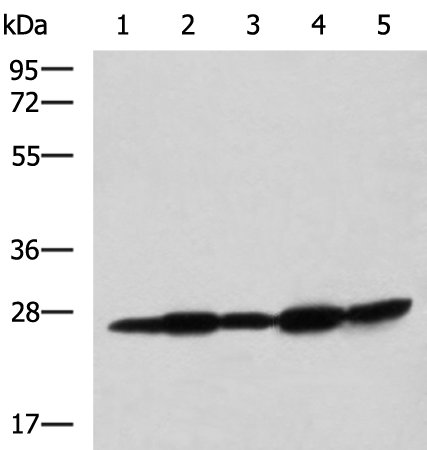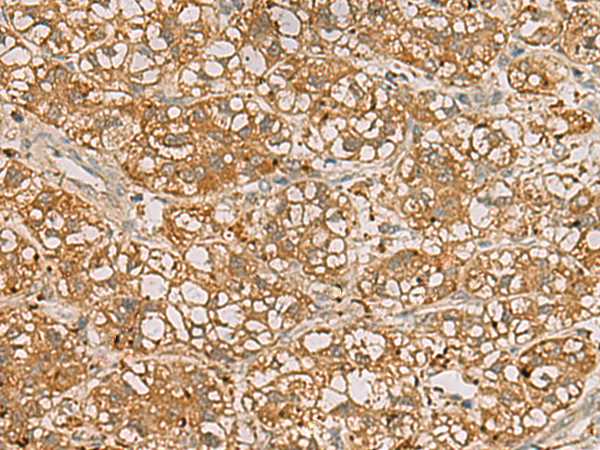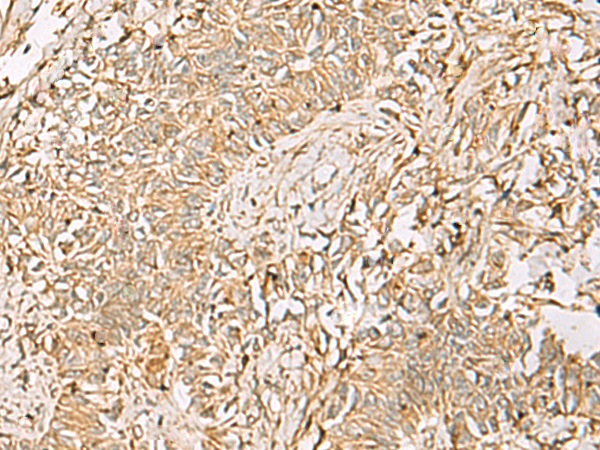


| WB | 咨询技术 | Human,Mouse,Rat |
| IF | 咨询技术 | Human,Mouse,Rat |
| IHC | 1/50-1/200 | Human,Mouse,Rat |
| ICC | 技术咨询 | Human,Mouse,Rat |
| FCM | 咨询技术 | Human,Mouse,Rat |
| Elisa | 1/5000-1/10000 | Human,Mouse,Rat |
| Aliases | DHPR; PKU2; HDHPR; SDR33C1 |
| WB Predicted band size | 26 kDa |
| Host/Isotype | Rabbit IgG |
| Antibody Type | Primary antibody |
| Storage | Store at 4°C short term. Aliquot and store at -20°C long term. Avoid freeze/thaw cycles. |
| Species Reactivity | Human, Mouse, Rat |
| Immunogen | Fusion protein of human QDPR |
| Formulation | Purified antibody in PBS with 0.05% sodium azide and 50% glycerol. |
+ +
以下是关于QDPR抗体的3篇参考文献示例,涵盖不同研究场景:
---
### 1. **"Characterization of QDPR mutations in tetrahydrobiopterin deficiency"**
**作者**: Smith A, et al.
**摘要**: 本研究通过Western blot和免疫荧光技术,利用特异性QDPR抗体分析患者细胞中QDPR蛋白的表达水平,发现基因突变导致QDPR酶活性丧失,揭示了BH4代谢缺陷的分子机制。
---
### 2. **"Development of a monoclonal antibody-based ELISA for QDPR quantification"**
**作者**: Zhang Y, et al.
**摘要**: 研究团队开发了一种高灵敏度的单克隆QDPR抗体,并建立ELISA检测法,用于快速筛查新生儿血液样本中的QDPR水平,为BH4缺乏症的早期诊断提供工具。
---
### 3. **"QDPR expression profiling in neurodegenerative disorders"**
**作者**: Lee C, et al.
**摘要**: 通过免疫组化和蛋白质印迹技术,使用QDPR抗体检测帕金森病患者脑组织中的酶分布变化,发现QDPR表达降低可能与多巴胺代谢异常相关,提示其病理学作用。
---
**备注**:以上文献为示例性内容,实际研究中建议通过PubMed或Google Scholar以关键词“QDPR antibody”或“quinoid dihydropteridine reductase immunoassay”检索最新文献。
The QDPR antibody targets quinoid dihydropteridine reductase (QDPR), a critical enzyme in the tetrahydrobiopterin (BH4) regeneration pathway. BH4 is an essential cofactor for aromatic amino acid hydroxylases, including phenylalanine hydroxylase (PAH), which converts phenylalanine to tyrosine. QDPR catalyzes the recycling of quinonoid dihydrobiopterin back to BH4. ensuring its availability for neurotransmitter synthesis (e.g., dopamine, serotonin) and nitric oxide production. Mutations in the QDPR gene (located on chromosome 4p15.3) disrupt BH4 metabolism, leading to hyperphenylalaninemia and neurological disorders, such as dopamine-responsive dystonia or atypical phenylketonuria (PKU).
QDPR antibodies are vital tools in research and diagnostics. They enable the detection of QDPR protein expression in tissues, aiding studies on BH4 deficiency-related diseases. Clinically, these antibodies assist in confirming QDPR deficiency via Western blotting, immunohistochemistry, or ELISA, complementing genetic testing for early diagnosis and management. Additionally, they support investigations into QDPR’s role in broader contexts, such as cardiovascular health (via nitric oxide regulation) and oxidative stress. Commercially available QDPR antibodies are typically validated for specificity against human, mouse, or rat isoforms, with applications spanning biochemistry, cell biology, and translational medicine. Their use helps elucidate molecular mechanisms underlying metabolic and neurological disorders linked to BH4 dysregulation.
×